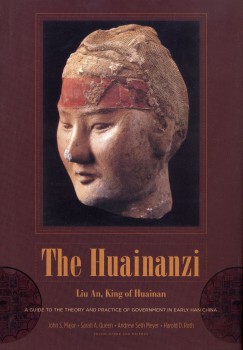Making Ancient Chinese Philosophy Accessible to Contemporary Scholars

For the first time, the Huainanzi has been completely translated into English by John S. Major '64 and his colleagues.
Details
Dating back to 2nd century B.C. China, the Huainanzi is one of the world's great works of political philosophy. But its formidable length (more than 1,000 pages) and difficult classical Chinese text deterred many academics from attempting to translate it into English—until now. Thanks to the 15-year dedication of retired historian John S. Major '64 and his colleagues, the first-ever complete English translation of the Huainanzi was released by Columbia University Press in March.
A former professor at Dartmouth College, Major has studied the Huainanzi—which was written during the reign of the Han Dynasty under the patronage of Liu An, king of Huainan—for most of his professional life. The book, he says, offers“all a modern monarch needs to know” and claims that the key to a successful reign lies in wisdom and mental discipline. Its 21 chapters are a series of essays resulting from literary and philosophical debates between Liu An and guests at his court, and span such topics as mythology, science, nature and politics.
“It struck me as a treasure trove of information about the intellectual life of early China,” says Major.“It seemed to me that most people in the field were not very aware of it; they might dip into it from time to time but few people were really engaging with the text.” His doctoral dissertation for his Ph.D. in History and East Asian Languages at Harvard University was a heavily annotated translation of one of the Huainanzi's chapters.
In 1994, Major joined forces with fellow historians Andrew Meyer (Brooklyn College), Sarah Queen (Connecticut College) and Harold Roth (Brown University) to undertake the mammoth task of translating the Huainanzi completely into English. The group began by dividing up responsibility for first-draft translations of the book's chapters. Then, each draft was read and critiqued by other team members. During the last three years of the project, the team members put aside their other research and writing duties to concentrate on finishing the translation.
“The last stage consisted of reading the entire work aloud,” says Major.“One person would read while the other three followed along in the classical Chinese text, looking for errors.”
Major believes that teamwork was essential to the success of the project.“It was a much more complicated way of doing the task than a solo effort might have been, but the result is much better than any of us could have done alone,” he says.
He hopes that scholars and students will use this Huainanzi translation—as well as an abridged paperback version due out in 2011—to broaden their perspectives of Han Dynasty China.“There's no excuse for ignoring this important text anymore,” he says.



